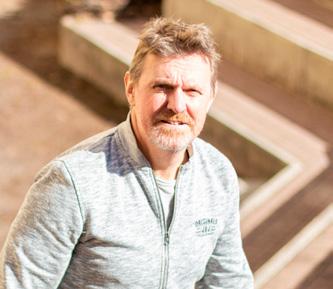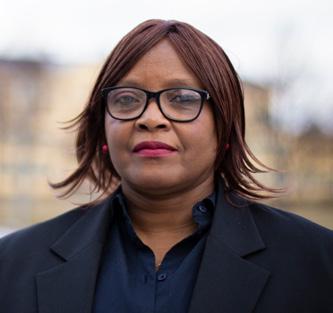
2 minute read
He is passionate about the joy of movement
from LEVE! Nr 2 2023
Sven Blomqvist is a physiotherapist and researcher who wants everyone to be able to exercise. Specialising in adapted physical activity, he focuses on helping people with disabilities to get moving.

“Exercising is my thing. When I was in comprehensive school, there was a reform, so people with disabilities were integrated into the 'normal' school. I met them at recess, got to know them and saw beyond their difficulties. They are a vulnerable group and need support,” he says.
Sven Blomqvist has worked at the University of Gävle for about ten years now, in teaching and research. He works in the sports science study programme, which focuses on a health-promoting lifestyle. The programme has two main tracks: adapted physical activity (AFA) and doping. AFA is about seeing and including all groups of people in sport to enable a physically active lifestyle for everyone, for example, people with scourges such as diabetes and high blood pressure, or people with disabilities.
“These groups have poorer health, and we really need to stimulate and adapt physical activity in an educational manner. Everyone benefits from exercise and many people benefit from exercise as part of their treatment,” Sven Blomqvist says.
“Since then mediation has been used less and less. Nonetheless, police and prosecutors are obliged to consider mediation, and municipalities are obliged to offer mediation to all young offenders under the age of 21 as well as cooperation talks or mediation in custody disputes. Importantly, the method builds on voluntary participation,” Lottie Wahlin says.
Men exposed to violence suffer in silence
Men who are victims of psychological violence often experience stress, anxiety, and depression, according to a study from University of Gävle. However, there are no concrete support systems that help us find these men who rarely report or talk about the violence.
“This is a silent epidemic,” says researcher Gloria Macassa. She has co-authored an article that shows that the health of men who are victims of violence is often very poor and that they experience psychological violence to a higher extent than physical violence.

“They experience stress and anxiety and may become depressed. Instead of contacting health care services and talk about the violence, they suffer in silence. This affects their mental health negatively and can be related to suicidal thoughts and suicide,” Gloria Macassa says.
The men’s reluctance to seek medical care is often related to a fear of not being taken seriously and of being ridiculed.
“We who work in public health and primary care need to show more adamantly that we take men seriously and we must change the way we think about violence against men.”
The gifted hide their talents to blend in
According to an anthology, gifted pupils in Swedish schools may hide their talents to avoid the risk of being left out.
The concept of giftedness is gaining increasing attention, and at University of Gävle, PhD student Caroline Sims is focusing on this subject in her research. Sims points out that there is a misconception that gifted pupils are self-sufficient and do well without the attention of their teachers.

Sims says that to fit in, many gifted pupils are used to underperforming and some have lost confidence in school altogether. They may become restless and misdiagnosed with ADHD, while the real problem is that they think so fast that they need more challenging tasks.
“I am passionate about the idea of letting all people have a place in the spotlight. There are many types of talents that we need to build a place for, from mathematicians and logicians to language learners, artists, and practitioners. The problem is that our school system does not value and encourage the abilities of gifted pupils," says Caroline Sims.







